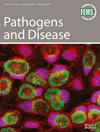维生素d诱导的LL-37在DENV-2感染期间调节人原代巨噬细胞的先天免疫反应。
IF 2.7
4区 医学
Q3 IMMUNOLOGY
引用次数: 6
摘要
登革热是一种由蚊媒登革热病毒(DENV)引起的急性和可能严重的疾病,登革热的流行对整个亚热带地区的临床医生和卫生保健服务构成了重大挑战。严重的疾病发作与对病毒的炎症反应失调有关,目前没有药物可以减轻疾病症状。LL-37是一种有效的抗菌肽,具有广泛的免疫调节特性。在这项研究中,我们评估了LL-37对人单核细胞源性巨噬细胞(MDMs)中denv -2诱导反应的影响。我们发现,同时暴露于外源的LL-37和DENV-2导致病毒在MDMs中的复制减少,而暴露于DENV-2后添加LL-37则没有。有趣的是,后一种情况减少了IL-6的产生,增加了参与病毒感知和抗病毒反应的基因的表达。最后,我们证明了在DENV-2感染的MDMs中,低内源性的LL-37水平和有限的LL-37的产生可以通过在维生素D (VitD3)的存在下分化MDMs而增加。综上所述,本研究表明,LL-37除了具有抗菌特性外,还具有DENV感染的免疫调节特性,并且VitD3可以增加其产量。本文章由计算机程序翻译,如有差异,请以英文原文为准。
Vitamin D-induced LL-37 modulates innate immune responses of human primary macrophages during DENV-2 infection.
Epidemics of dengue, an acute and potentially severe disease caused by mosquito-borne dengue virus (DENV), pose a major challenge to clinicians and health care services across the sub(tropics). Severe disease onset is associated with a dysregulated inflammatory response to the virus and there are currently no drugs to alleviate disease symptoms. LL-37 is a potent antimicrobial peptide with a wide range of immunoregulatory properties. In this study, we assessed the effect of LL-37 on DENV-2-induced responses in human monocyte-derived macrophages (MDMs). We show that simultaneous exposure of exogenous LL-37 and DENV-2 resulted in reduced replication of the virus in MDMs, while the addition of LL-37 post-exposure to DENV-2 did not. Interestingly, the latter condition reduced the production of IL-6 and increased the expression of genes involved in virus sensing and antiviral response. Finally, we demonstrate that low endogenous levels and limited production of LL-37 in MDMs in response to DENV-2 infection can be increased by differentiating MDMs in the presence of Vitamin D (VitD3). Taken together, this study demonstrates that in addition to its antimicrobial properties, LL-37 has immunomodulatory properties in the curse of DENV infection and its production can be increased by VitD3.
求助全文
通过发布文献求助,成功后即可免费获取论文全文。
去求助
来源期刊

Pathogens and disease
IMMUNOLOGY-INFECTIOUS DISEASES
CiteScore
7.40
自引率
3.00%
发文量
44
期刊介绍:
Pathogens and Disease publishes outstanding primary research on hypothesis- and discovery-driven studies on pathogens, host-pathogen interactions, host response to infection and their molecular and cellular correlates. It covers all pathogens – eukaryotes, prokaryotes, and viruses – and includes zoonotic pathogens and experimental translational applications.
 求助内容:
求助内容: 应助结果提醒方式:
应助结果提醒方式:


